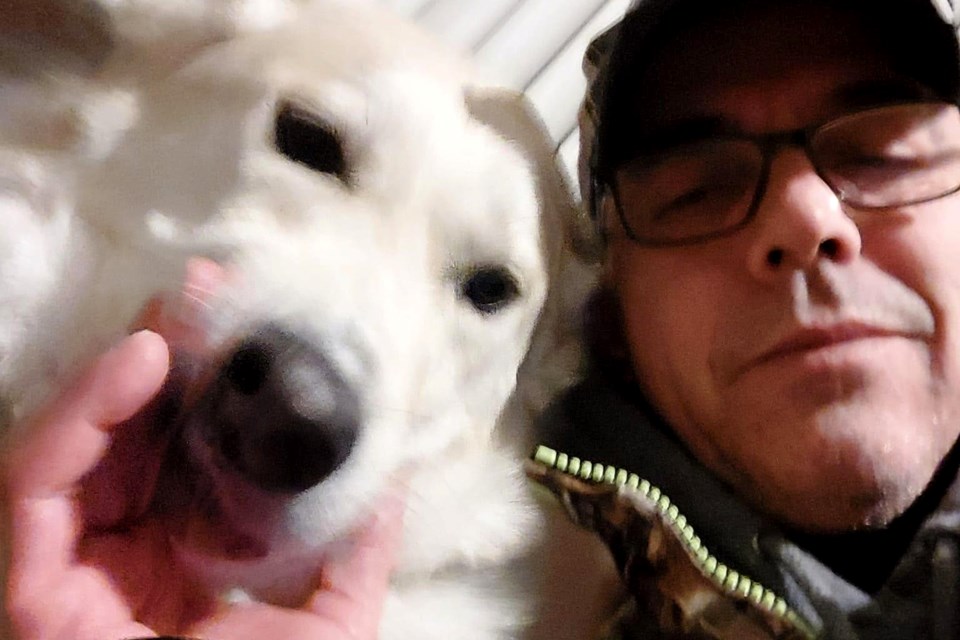A few days after being accidentally bitten by his two-year-old husky, Tinkerbell, Chelmsford man Sylvain Boissonneault died in hospital as a result of capnocytophaga bacteria in the bite.
“It’s just insane,” the man’s sister, Carolyn Chevrette, told Sudbury.com, a sister site of SooToday. “So tragic that he died by the animals that he loved with his entire heart.”
Boissonneault, 56, died on June 8, leaving behind daughters Jasmine, 12, and Arey-Elle, 8, whom he had partial custody of.
Chevrette reached out to Sudbury.com in order to share her brother’s story and bring awareness to the extremely rare infection that took his life.On June 3, she said, Tinkerbell was having a seizure, so Boissonneault put his hand in her mouth thinking he would help prevent her from swallowing her tongue. She clamped down and bit into his thumb. Capnocytophaga bacteria lives in the mouths of dogs and cats. While it doesn’t sicken the animal, it can be fatal in humans.
Tinkerbell’s bite introduced the bacteria into Boissonneault’s body. Boissonneault took Tinkerbell to a veterinarian to get medication for her seizures, and “probably downplayed the bite to the vet but still never got it checked,” Chevrette said.
Two days later, Chevrette said her brother started getting a fever, so he called a virtual clinic, mentioned the dog bite, and was told it was influenza. “We kept telling him to go get it checked, but he was kind of a procrastinator and said it was just a dog bite,” Chevrette said.
During the night of June 7, Boissonneault suffered a fever, sweats and sore joints while spending the night alone at his Chelmsford home. In the morning, he called an ambulance. His mother and sister found out at 8 a.m. June 8 and met him at Health Sciences North. Chevrette picked her nieces up from school to see him.
He was coherent at the time and believed he’d be out of the hospital within a few days.
“That’s what he was voicing to all of us; ‘I’ll be fine, I’ll be fine, I’ll be out of here soon',” Chevrette said, adding this appeared to be the case, with his blood work showing promise. However, his health took a sharp decline that evening as Boissonneault developed a toxic blood infection. He died at 10:25 p.m., less than 18 hours after he was admitted.
Boissonneault always took great care of his dogs, Chevrette said, and his obituary notes he is “now with his dogs Tiara and Pressor.”
Tiara was a black lab mix who lived to the age of 18, and Pressor was a 13-year-old yellow lab mix who died a few days before Tinkerbell had her seizure.
“He always had dogs, and they were his kids, alongside his real kids; these were his fur kids, he adored them,” Chevrette said. “People are just shocked. Everybody that knows him is shocked that he passed from a dog bite.”
A Health Sciences North spokesperson redirected Sudbury.com to Public Health Sudbury and Districts for comment on capnocytophaga bacteria. The health unit spokesperson, in turn, clarified they don’t have any information on its prevalence in the region because it’s not designated as a “Disease of Public Health Significance.”
They did, however, advise people to report animal bites to their local public health unit and to ensure pets have up-to-date rabies vaccinations.
The federal government reports capnocytophaga has affected 200 people between 1976 and 2010, while the Centers for Disease Control and Prevention reports the mortality rate is approximately 30 per cent.
“If you have been bitten by a dog or cat, wash the bite area right away with soap and water and call your doctor, even if you don’t feel sick,” the CDC’s website urges. “This is because dog and cat bites can pose a risk for rabies, as well as capnocytophaga.”
Boissonneault was the owner and operator of AirTech Heating Air Conditioning and Refrigeration, whose loyal customers Chevrette said have joined family, friends and staff in offering their condolences in recent days.
Tinkerbell remains in quarantine at Boissonneault’s home where she is routinely checked up on, although Chevrette clarified there’s nothing wrong with the husky.
Although capnocytophaga bacteria infection is rare among humans, it is common in dogs and cats. It remains to be seen what will be done with Tinkerbell, as Chevrette’s duplex household already includes two dogs, two cats and two guinea pigs.
Tyler Clarke covers city hall and political affairs for Sudbury.com.
